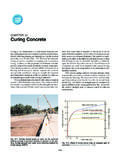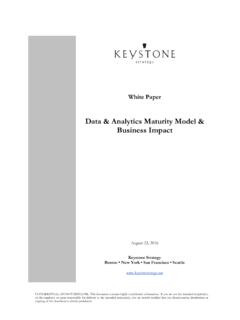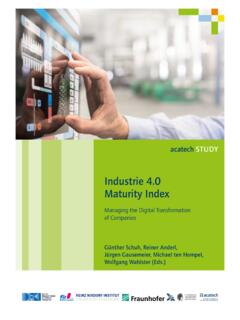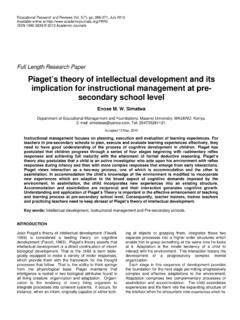Transcription of Play and Cognitive Development: Formal Operational ...
1 Journal of Education and Practice ISSN 2222-1735 (Paper) ISSN 2222-288X (Online) , , 2016 72 Play and Cognitive Development: Formal Operational Perspective of Piaget s Theory Saghir Ahmad* Scholar at Institute of Education & Research, University of the Punjab, Pakistan Dr. Abid Hussain Ch Prof. at Institute of Education & Research, University of the Punjab, Pakistan Ayesha Batool PhD Scholar at Institute of Education & Research, University of the Punjab, Pakistan Khadija Sittar PhD Scholar, Institute of Education & Research, University of the Punjab, Pakistan Dr. Misbah Malik Lecturer at University of Education, Lower Mall Campus, Lahore, Pakistan Abstract Cognitive development is the construction of thought processes, including remembering, problem solving and decision making, from childhood through adolescence to adulthood.
2 Play contributes to Cognitive development in a number of ways. It helps children to develop imaginary and memory which is essential for thinking about past, present and future. The main purpose of the study was to find out the role of play regarding Cognitive development of children. This study was quantitative in nature. Survey method was used to collect data. A sample of three hundred students was selected from both public and private sector schools of Lahore city. A five point Likert scale was used to collect data. Mean, t-test, One Way ANOVA and percentages were applied to analyze the data. The major finding of the study indicated that students feel curiosity to explore new things, new ideas by play. Keywords: Play, Cognitive development, Formal Operational stage 1. Introduction Cognitive improvement is the development of thought processes, including recalling, critical thinking and basic leadership, from youth through youthfulness to adulthood.
3 The assorted changes in feeling that happen over the life range, in relationship with expanding physiological maturity (development) and experiences (Sternberg, 2003). Cognition incorporates each mental procedure that might be depicted as an affair of knowing (counting, seeing, perceiving, considering, and thinking, as recognized from an ordeal of feeling or have will (Britannica, 2006). Psychological improvement concentrates on how kids learn and handle data. It is the improvement of the reasoning and arranging frameworks of the psyche. It includes dialect, mental symbolism, considering, thinking, critical thinking, and memory advancement. Play has a significant role in the development of a child s creative abilities. Hestenes and Carroll (2000) quoted that according to the vygotsky, play signals the beginning of imagination and the ability to think creatively. Another element of early child Education (ECE) curriculum is art activities.)
4 Art is considered a best way to enhance the Cognitive abilities of young children (Jones, 2003). Researches show that appropriate use of computer enhances creatively using appropriate software make significant picks up in insight, nonverbal aptitudes, basic learning, long haul memory and complex being (Johnson, 1999). There is also fixed time for story telling in which children are to read different story books. It enhances the young children s curiosity and exploration (Lanchester, 1990). All mentioned activities play a vital role in the Cognitive development of the students who are getting early child Education (ECE) experience by enhancing their abilities. A study was conducted in which investigated the presence and growth of Early child Education (ECE) students met cognition as they engaged in the writing process, the students were found able to provide appropriate answers to questions that required them to talk about thinking (Sandall, 2004).
5 According to Santrock (2005) Play exercises offer numerous open doors for controlling, investigating and honing and are hence profoundly suggested as road for cultivating the intellectual skills of youthful kids. In other words of Wood and Attfield (2005) many advocate of Early child Education (ECE) emphasize the importance of play. Frobel through his gifts and occupations and Montessori, through her sensory materials, saw children s active participation with concrete influences contemporary thinking about the Cognitive basis for play. From piagetian perspective play is literally Cognitive development. Through play children learn information and acquire skills that are crucial to their Cognitive development. The child who is playing on a water table may be Journal of Education and Practice ISSN 2222-1735 (Paper) ISSN 2222-288X (Online) , , 2016 73 discovering some objects sink while others float.
6 The one on the swing is exploring notion, gravity and safety. The child who is playing with blocks is learning about colors, balance, depth and volume (Abott & Moylett 1999). Play contributes to Cognitive development in a number of ways. Play helps children to develop imaginary and memory which are essential for thinking about past, present and future (Klein, Wirth, & Linas, 2003). Play gives children opportunity to practice problem solving and decision making abilities, two important elements of Cognitive development. Play can have a significant role in the development of a child s creative abilities. The development of creativity is also related to Cognitive development because creative thinking contributes to problem solving. Through play, teen-agers learn how to cooperate with others, create dialect aptitudes perceived and take care of issues, and find their human potential.
7 To put it plainly, play helps kids understand and discover their place on the earth. Most children s Cognitive skills increase rapidly during Formal Operational stage. It is essential to remember that children of the same age may not have the same levels of Cognitive competence. 2. Literature Review Play is the vital part, the vehicle by which youngsters impart, entertain, find out about their general surroundings, comprehend themselves as well as other people, manage their-issues, and practice a portion of the abilities they will use later on" (Harley, 1971). "Play is that absorbing activity in which healthy young children participate with enthusiasm and abandon" (Bergen, 2002). "Through play, children learn about cultural norms and expectations, discover the workings of the world, and negotiate their way through their surroundings" (Klein, Wirth, & Linas, 2003).
8 Play helps children in Cognitive development. As from above definition through play children learn about their environment and through play they discover their world. They know about new things. Play has fundamental means by which they learn new skills and management skills and also develop problem solving skills. Play also helps children in Cognitive development in a number of ways. It helps children in their imaginary and memory which are essential in their thinking. As adolescents play with materials, they have the chance to get things going or change things; in this way, they encounter some control over their reality. Since they are in control when they play, they for the most part pick materials and exercises for which they have a few abilities or interest, so they are relaxed. Their play encounters are effective, so their certainty is improved (Brewer, 1995). Through play, kids interface with their reality and the majority of its items, procedures, and occasions If you observe even the most youthful kid with an obscure article you will see first the procedure of investigation touching, noticing, tasting, looking, and listening took after by control of the articles.
9 Play with articles, circumstances, forms, and different parts of their reality is kids' method for social affair data and interfacing the new data with what they have beforehand experienced or definitely know (Jones, 2003). Here and there through enthusiastic physical play and infrequently through imagine play, children can tell grown-ups what they are feeling. They will be unable to name or enlighten us regarding their apprehension of creatures, however they can indicate it as they profess to be fierce beasts or to flee from the creatures. Youngsters can't let us know that they're disappointed, however they can express it by slamming cymbals together or playing an extremely bossy grown-up to their dolls. Play permits one to express the full extent of feelings euphoria, delight, torment, disappointment, resentment, and invigoration (Santrock, 1990). Researchers Hestenes and Carroll observed the play of twenty nine children with and without incapacities in their classroom and on the play area to better comprehend the encounters of inclusive preschool settings for children.
10 Legislative mandates have required that children be placed in the least restrictive environments, resulting in a huge increase in inclusive programs for children of all ages. Even though the preschool children in the study had diverse levels of capacity, every kid occupied with the majority of the different sorts of play accessible. Both gatherings of youngsters, those with inabilities and their regularly creating peers, invested a greater amount of their energy in gross and fine engine play than in tangible or sensational play. In this study, instructor nearness was a huge indicator of kids' comprehensive collaborations. Former research had proposed that educators could start and encourage play between ordinarily emerging youngsters and toddlers with incapacities through their modeling and supervision. Although we need to understand better how teacher interactions influence children's play in inclusive settings, this study and others make it clear that a teacher's presence and support is a key factor in the frequency of inclusive interactions.
















